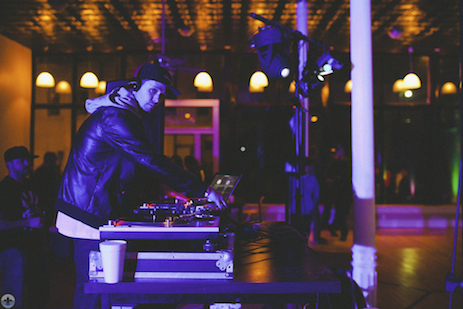photograph by James Palmour
One of the most remarkable aspects of living in St. Louis is the variety of opportunities available to expand one’s knowledge, whether cultural, scientific, social or otherwise. For the uninitiated, One Round Killer provided a world of insight into a practice with a near 50-year history; on this occasion, a mere $15 provided for more than five hours of entertainment, and was the visitor’s passport into a world that meshes art and athletics into a uniquely urban expression of virtuosity.
photograph by Jeni Kulka
photograph by Jarred Gastreich
photograph by Jason Gray
photograph by Dan Henrichs Photography, St. Louis
photograph by Theresa Harter
The 1960’s and 1970’s were a time of rapid reinvention and identity assessment in urban neighborhoods across the country. Despite all of the advancements of the Civil Rights Movement, many minority groups living in cities continued to deal with lingering racism, and the expanding entropy of inner city neighborhoods resulting from deep population loss and economic disparity. From this climate, a dance called “rocking” grew. Originating in Bronx, New York, rocking is a dance designed to simulate the strong postures and declarations of street fighting. Erick “Airsick” Billings (owner of Breaklouis Entertainment, LLC -the organizer of One Round Killer) describes rocking as, “On your feet battling of another person, throwing what we call ‘burns’, which are direct disses, to your opponent. Burns are used to take away the confidence of your opponent. After all the moves, the dance is ultimately about who loses confidence first… Naturally, after rocking came ‘breaking’… Breaking is the only dance of Hip Hop.” For those unaware, breaking is the first “B” in “B-Boy”.
photograph by Jeni Kulka
photograph by Jarred Gastreich
photograph by James Palmour
As the 1970’s wore on, other aspects of urban culture coalesced to form Hip Hop, a platform for celebrating unifying life experiences that incorporates music, dance, vocalization, and visual expression. According to Afrika Bambaataa, an early practitioner and the creator of Zulu Nation, the four pillars of Hip Hop are: 1. the MC; 2. the DJ; 3. the B-Boy; 4. Graffiti.
The elevation of the B-Boy to becoming a cultural paradigm is an interesting progression. Billings recounts the “park jams” of the Bronx, “Breaking stemmed from young, troublesome kids in gangs… Gangsters would rival other[s], and someone just had to hit the floor, throwing burns on different levels… [Eventually, they were] having so much fun [that] a circle started to form. Then, the gangsters would try to prove their worth without fighting. Although, many times it did end in a street fight.” Today, breaking is a well-honed craft, with established rules and etiquette less likely to result in a physical altercation. In fact, the majority of the battles we witnessed at One Round Killer ended in an embrace or a handshake, even when victory was clearly conceded to one of the parties involved. It is evident that the B-Boys we observed cherish and uphold the art, and operate at a high level of professionalism. Still, that is not to say that the burns weren’t apparent, effective, and generally inciting of a big reaction from the crowd.
photograph by Patrick Gioia
photograph by Jason Gray
photograph by Theresa Harter
In St. Louis, the global idea of Hip Hop reached the city early, but the B-Boy scene did not immediately take off. According to Erick, “St. Louis has a generally young scene currently, and has only a few veterans that lead the way.” It should be noted that one of the veterans is Erick, aka B-Boy Airsick. “[The] St. Louis dance scene is very segregated, and always has been. I am trying to change that idea… I try and get all the best dancers under the Hip Hop umbrella, and put them on the same stage to really shine.” It is from this concept that Billings envisioned Breaklouis Entertainment, LLC., and One Round Killer.
The premise behind One Round Killer is simple: each dancer gets one opportunity to prove that they are better than their opponent, ie. “one round”. Each round is judged by a panel of experts based upon a structure established by Airsick. The rules for judging prevent the panelists from allowing their own preferences to intercede on the competition, and result in a fairer, more evenhanded competition. Generally, breaking is judged in five categories: 1. Foundation/Fundamentals; 2. Artistics/Creativity; 3. Dynamics/Power Moves; 4. Execution; 5. Battle Tactics. The judges for One Round Killer came from across the country, as did the competitors, and were each respected B-Boys. Among the competitors, the winner was Mijo, of Motion Disorderz (a world-renowned crew from Milwaukee, Wi.), and the runner-up was Palmer, of Havikoro (a crew from Houston). In addition to bragging rights, Mijo won $750, while Palmer took home $500. Cash prizes were awarded all the way out to 8th place, and were sanctioned by The Pro Breaking Tour. Impressively, 145 B-Boys signed up for the competition, and more than 200 people came to witness the exciting event.
photograph by Theresa Harter
photograph by Dan Henrichs Photography, St. Louis
photograph by Amanda Miller
photograph by Jason Gray
photograph by Theresa Harter
photograph by Jeni Kulka
photograph by James Palmour
photograph by Jasmine Bell
Erick Airsick Billings is a member of ENI (a crew from STL), and of Motion Disorderz. His participation and wisdom was invaluable for writing this entry. The Photo Flood family sends a sincere thanks to Erick, and the whole Breaklouis organization, for the opportunity to attend as guests and observers to One Round Killer. A very special thanks also to Kevin Myers, creator of Rise of the Robots, for arranging the connection.



























